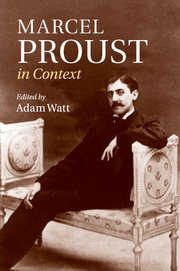Book contents
- Frontmatter
- Contents
- List of Illustrations
- Notes on contributors
- Figure I. Marcel Proust, portrait in oils by Jacques-Émile Blanche, 1892
- Preface
- Figure 2. Proust photographed on his death-bed by Man Ray, 1922
- Note on the text
- Chronology
- Part I Life and works
- Part II Historical and cultural contexts
- Part III Critical reception
- Chapter 24 Critical reception during Proust's lifetime
- Chapter 25 Early critical responses, 1922 to 1950s
- Chapter 26 Mid-twentieth-century views, 1960s to 1980s
- Chapter 27 Late-twentieth- and twenty-first-century responses
- Chapter 28 Modernism
- Chapter 29 Adaptations/afterlives
- Chapter 30 Translations
- Further reading
- Index
- References
Chapter 24 - Critical reception during Proust's lifetime
from Part III - Critical reception
Published online by Cambridge University Press: 05 November 2013
- Frontmatter
- Contents
- List of Illustrations
- Notes on contributors
- Figure I. Marcel Proust, portrait in oils by Jacques-Émile Blanche, 1892
- Preface
- Figure 2. Proust photographed on his death-bed by Man Ray, 1922
- Note on the text
- Chronology
- Part I Life and works
- Part II Historical and cultural contexts
- Part III Critical reception
- Chapter 24 Critical reception during Proust's lifetime
- Chapter 25 Early critical responses, 1922 to 1950s
- Chapter 26 Mid-twentieth-century views, 1960s to 1980s
- Chapter 27 Late-twentieth- and twenty-first-century responses
- Chapter 28 Modernism
- Chapter 29 Adaptations/afterlives
- Chapter 30 Translations
- Further reading
- Index
- References
Summary
In Le Temps retrouvé, the Proustian Narrator describes the discouraging experience of one's work being misunderstood: ‘Before very long I was able to show them a few sketches. No one understood anything of them . . . Those passages in which I was trying to arrive at general laws were described as so much pedantic detail’ (6: 442; IV, 618). This experience haunts not only the fictional Narrator, but also his creator up until his death, which is why Proust took such an interest in his public and, as his correspondence shows, often responded to his reviewers. These letters constitute an active participation in critical debates and this is, as has recently been remarked, one of the reasons for separating the history of the reception of Proust's œuvre before and after his death. While Proust was always supported by a number of influential friends, a cursory overview of the early reception of his work shows that long before he was an author of established fame, Proust had to cope with being read as an unserious and superficial writer. His readership increased with the publication of each volume of the Recherche and led critics increasingly to focus on the literary value of his work. But Proust's reception during his lifetime is always set against the backdrop of often-hostile criticism, frequently based on the myth of the sickly, reclusive snob writing from the safety of his cork-lined room.
Information
- Type
- Chapter
- Information
- Marcel Proust in Context , pp. 183 - 190Publisher: Cambridge University PressPrint publication year: 2013
